Edition: 2 to 31 December 2024
 © FAO/Alia Dwirahmani | INDONESIA National TV talk show promotes collaboration to prevent pandemics Supported by the United States Agency for International Development (USAID), FAO and the Coordinating Ministry of Human Development and Cultural Affairs (CMHDCA) partnered with KompasTV to produce a talk show, 'Satu Tekad, Indonesia Sehat,' highlighting One Health collaboration to prevent future pandemics. Aired on 11 December, the programme featured experts from FAO, the Ministry, and the Boyolali subnational government, discussing zoonotic and emerging infectious disease threats. Boyolali’s successful One Health implementation was showcased, emphasizing public awareness and actionable steps for a healthier and safer future. |
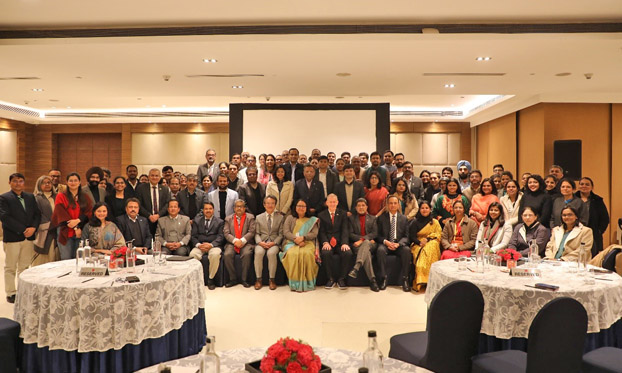 © FAO/Dipesh Solanki | INDIA Celebrating ECTAD 20th anniversary in India On 23 December, FAO marked the 20th anniversary of the ECTAD programme with a celebratory event in New Delhi. Supported by USAID, the event brought together over 80 participants from government, international agencies, donor organizations and the private sector to highlight ECTAD’s contributions to animal health in India and globally. FAO, USAID and the Government of India reaffirmed their commitment to strengthening One Health initiatives and building sustainable animal health systems through continued collaboration. |
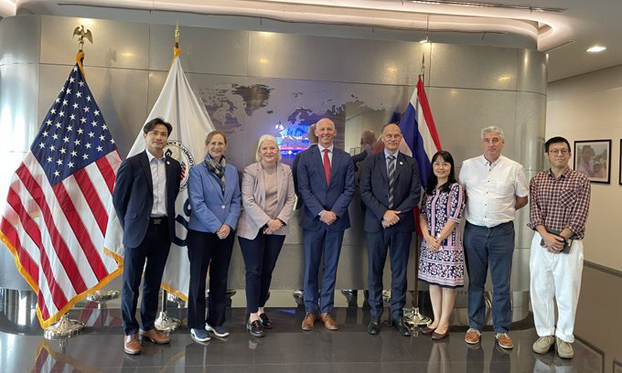 © USAID RDMA | ASIA AND THE PACIFIC Strengthening animal health systems in Asia and the Pacific FAO delegation led by Special Advisor to the Assistant Director General, Robert Simpson, Director of Liaison Office for North America, Jocelyn Brown Hall, along with the FAO ECTAD Asia-Pacific Regional Manager and other FAO team members, met with USAID Regional Development Mission for Asia (RDMA) Mission Director, Michael Ronning, and other RDMA team members to discuss RDMA and FAO cooperation on emergency and resilience in the Asia-Pacific region. The meeting highlighted the importance of humanitarian support at the time of crises, including both manmade and natural disasters, and FAO’s roles in humanitarian and emergency responses in agriculture and food. Both USAID and FAO reaffirmed a shared commitment to addressing regional and global humanitarian challenges.
|
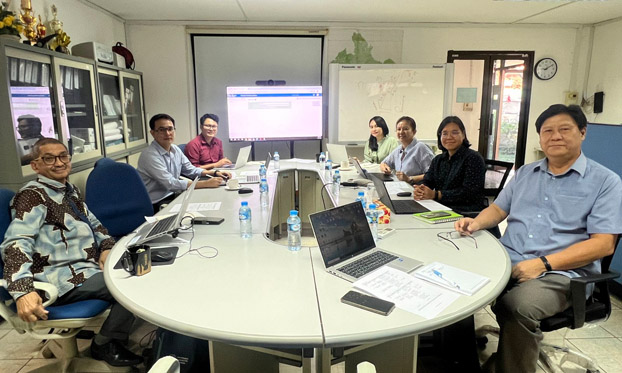 © FAO/Soukphaphone Chanthasenh | LAO PEOPLE’S DEMOCRATIC REPUBLIC Supporting the second phase planning for the Fleming Fund grant From 11 to 13 December, FAO participated in the phase 2 inception planning workshop for the Fleming Fund Grant in Vangvieng district, Vientiane province. The workshop enhanced grant management capabilities, fostered collaboration, and ensured alignment with phase 2 objectives. The FAO team gained critical insights into political economy analysis and mechanisms for coordinating across Fleming Fund grantees and funding streams in Lao People's Democratic Republic. The event concluded with the approval of a workplan aligned with phase 2 objectives and requirements. |
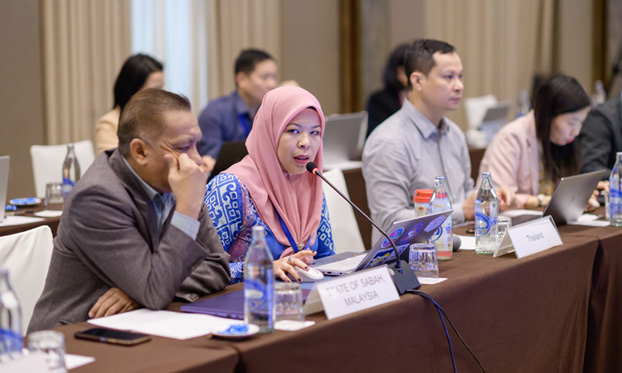 © FAO | ASIA AND THE PACIFIC Biosafety and biosecurity standards in captive wildlife facilities as a practical step to prevent zoonotic spillovers in Southeast Asia From 3 to 4 December, a cross-regional dialogue in Bangkok brought together Association of Southeast Asian Nations (ASEAN) sectoral bodies and European Union (EU) member states to address biosafety and biosecurity standards in Southeast Asia's captive wildlife facilities. The Dialogue, led by FAO in collaboration with the United Nations Office on Drugs and Crime (UNODC) and the United Nations Environment Programme (UNEP), was funded by the EU through the Safety across Asia For the global Environment (SAFE) project. It highlighted zoonotic risks in the wildlife captive management setting based on initial assessments gathered by the project. Experts emphasized the need to improve veterinary oversight and public awareness to address illegal wildlife trade and unsafe practices particularly for wildlife captive management. With ASEAN’s leadership, stakeholders aim to prioritize the formalization and enforcement of the standards to protect public health, conserve biodiversity and reduce pandemic risks. Read the news here. |
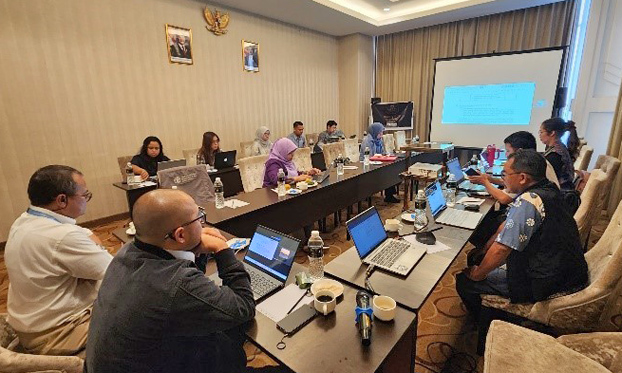 © FAO/Andri Jatikusumah | INDONESIA Finalizing cross-sector coordination guidelines for zoonoses and emerging infectious disease response FAO, in collaboration with the Coordinating Ministry for Human Development and Cultural Affairs of Indonesia (CMHDCA) and USAID, hosted a workshop from 9 to 10 December in Depok, West Java, to finalize cross-sector coordination guidelines for addressing zoonoses and emerging infectious diseases. Aligned with CMHDCA Regulation No. 7 of 2022, the guidelines support the establishment of coordination teams (TIKOR and TIKORDA) at all administrative levels. Following trial implementations in West Java and Yogyakarta provinces, the guidelines will be refined to enhance One Health collaboration. |
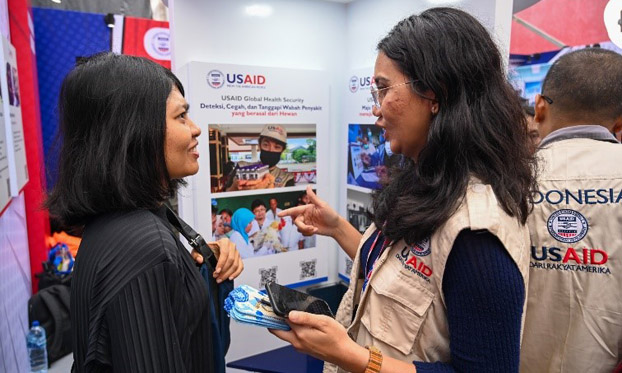 © USAID/Yehezkiel Tumewu | INDONESIA Celebrating 75 years of Indonesia–United States partnership: “Block Party event" On 14 December, FAO participated in the “Block Party” exhibition in Jakarta to celebrate the 75th anniversary of the Indonesia–United States partnership. Supported by USAID, the event showcased the efforts and achievements of USAID’s implementing partners. FAO highlighted the connection between environmental, animal, and human health in preventing zoonotic and emerging infectious diseases through the One Health approach. Visitors were generally aware of diseases like rabies and avian influenza, with the exhibition suggesting a focus on rural areas for future zoonotic control efforts. |
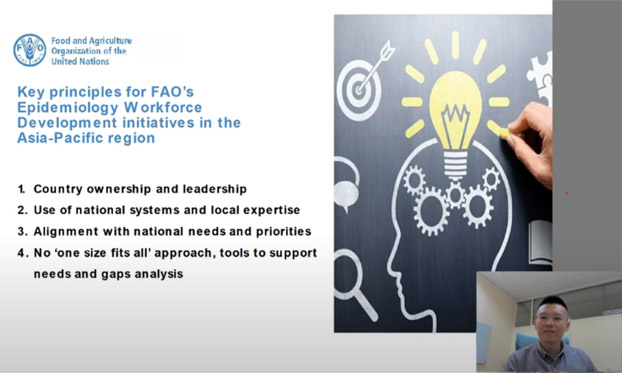 © FAO/Hao Tang | ASIA AND THE PACIFIC AND THE REPUBLIC OF KOREA Sharing FAO efforts in strengthening veterinary epidemiology in Asia-Pacific FAO participated in the 2024 international veterinary epidemiology workshop hosted by the Animal and Plant Quarantine Agency of the Republic of Korea from 25 November to 1 December. FAO ECTAD Hao Tang delivered a virtual presentation on FAO’s efforts to build veterinary epidemiology capacity in Asia-Pacific. Highlights included the epidemiology mapping tool, in-service field epidemiology training, and the regional veterinary epidemiology network. He emphasized FAO’s four-pillar approach—multi-dimensional, multi-level, multi-disciplinary and for long-term impact—to equip member countries with quality workforce to address emerging animal and public health challenges. |
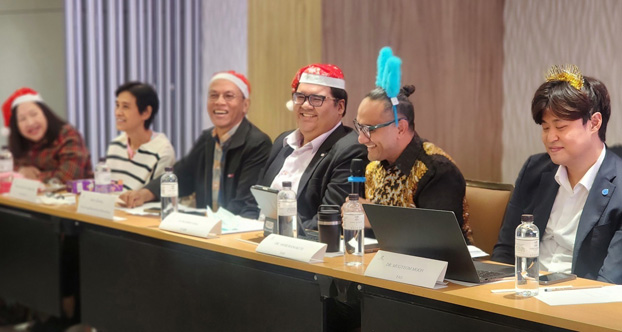 © FAO/Moon Mugyeom | ASIA AND THE PACIFIC Contributing to the curriculum development for infodemic management training FAO participated in the curriculum development workshop on the Global health approach for communicable diseases: Infodemic management training, organized by Thailand’s Department of Disease Control and the World Health Organization from 26 to 27 December 2024. The training, scheduled to be held in March 2025, aims to invite representatives from animal, environment, wildlife and public health sectors for strengthening the regional capacity in managing health-related information and tackling communication challenges for the Southeast Asia countries. FAO provided technical inputs to the workshop for the development and finalization of the training curriculum, such as One Health concept, fundamentals of infodemic, risk communications, and community engagement. |
Learn more about our work on partnerships here. | |
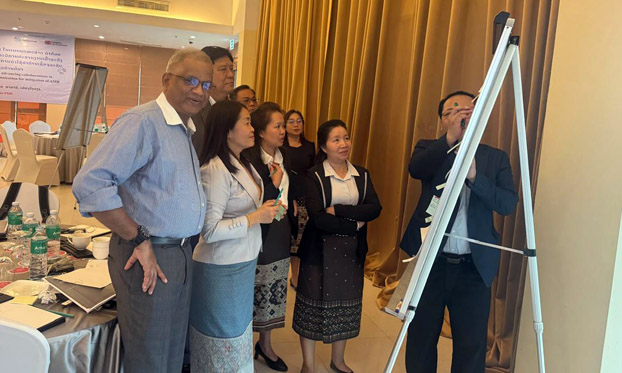 © National Animal Health Laboratory/Pan Keobounvong | LAO PEOPLE'S DEMOCRATIC REPUBLIC Review of Lao PDR's national AMR plan enhances surveillance and data sharing
From 4 to 6 December, FAO facilitated a multi-sectoral review of the national strategic plan on AMR in Lao People's Democratic Republic with support from UK Aid and the Fleming Fund. The evaluation identified gaps in implementation across human and animal health sectors and established a sustainable platform for AMR and antimicrobial use (AMU) surveillance data sharing. Participants outlined key priorities for the 2025–2030 strategic plan, emphasizing effective communication to promote responsible and prudent antimicrobial use. |
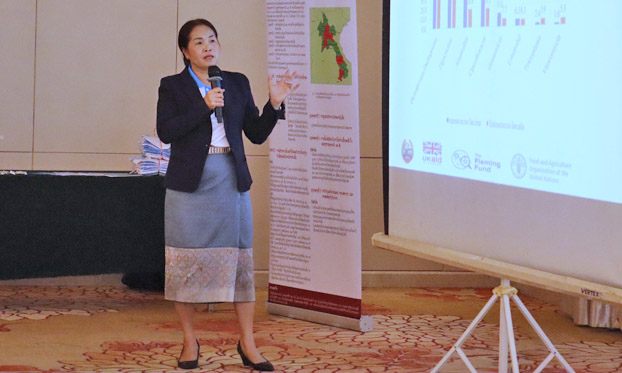 © FAO/Bounmee Maokhamphiou | LAO PEOPLE'S DEMOCRATIC REPUBLIC Raising awareness of AMR among livestock producers
Following the success of the AMR public walk during World Antimicrobial Awareness Week 2024, which engaged over 500 participants in Vientiane, the Department of Livestock and Fisheries (DLF) held workshops on 23 and 24 December to educate livestock producers and local officials. Conducted in Vientiane capital and province, these events highlighted the causes of AMR and shared key achievements in Lao People’s Democratic Republic such as the national strategic plan for AMR (2025–2030). Chaired by Souphavanh Keovilay, DLF Deputy Director-General, the workshops emphasized participants' roles as AMR awareness ambassadors. Technical support was provided by FAO and WHO, with funding from UK Aid and the Fleming Fund. |
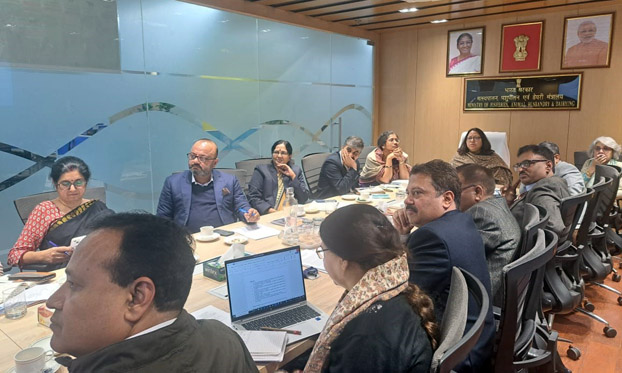 © FAO/Rajesh Dubey | INDIA Meeting advances antimicrobial use estimation and regulatory framework
On 9 December, FAO participated in a meeting chaired by Alka Upadhyay, Secretary, Animal Health Department, Government of India, to discuss the action plan for antimicrobial use estimation. The meeting emphasized strict adherence to the e-prescription module in the veterinary sector, with communication materials to be disseminated via Krishi Vigyan Kendras. Discussions also highlighted Pharmarak’s monitoring role and proposed a similar initiative by the National Pharmaceutical Pricing Authority, alongside strengthening veterinary drug regulations through state authorities and the Central Drugs Standard Control Organization. |
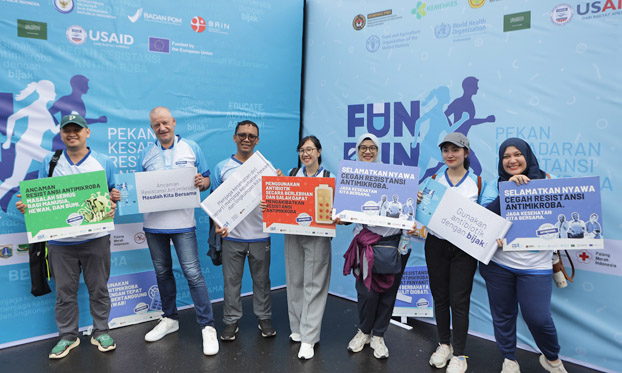 © FAO/Gilang Mahardhika Pratama | INDONESIA Fun run raises awareness on antimicrobial resistance during WAAW 2024
With support from USAID, FAO, CMHDCA, WHO, and the Ministry of Health organized a fun run in Jakarta on 8 December to mark the World Antimicrobial Resistance Awareness Week (WAAW). Under the theme “Educate. Advocate. Act Now,” the event promoted public awareness of AMR risks and prudent antimicrobial use. Highlights included health check-ups, first aid education, and participation by 500 attendees, including Minister of Health Budi Gunadi Sadikin and influencers. |
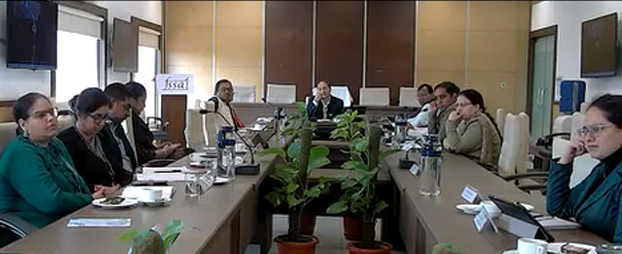 © FAO/Robin Paul | INDIA Hands-on session enhances AMR monitoring and collaboration
On 10 December, FAO participated in a practical session on FAO’s In-FARM and WHO’s WHONET AMR tools, organized by the Food Safety and Standards Authority of India in collaboration with WHO. The session provided insights into critically important antibiotics for humans, from an animal health perspective, enhancing FAO’s capacity to support global AMR efforts through improved tool implementation. It also reinforced partnerships with key stakeholders, fostering sustainable and effective solutions to combat antimicrobial resistance. |
.jpg?sfvrsn=16bba366_1) © FAO/Cresensia Hadiyanti | INDONESIA Advancing the development of national action plan for AMR Control (2025-2029)
On 12 and 18 December, FAO, in collaboration with CMHDCA, convened two meetings in Jakarta to advance the national action plan for AMR 2025-2029. The meetings, with input from ministries, WHO, and other stakeholders, reviewed and refined Chapter 3, focusing on strategies, targets, and activities for AMR control. Chapter 3 specifically outlined coordination mechanisms for multisector stakeholders. Ongoing discussions, supported by USAID and EU, have led to updates in the plan’s indicators to address emerging challenges and improve monitoring efforts, aligning national actions with global policies. |
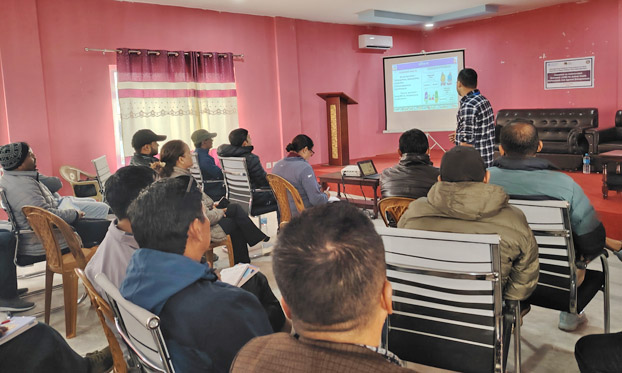 © FAO/Swochhal Prakash Shrestha | NEPAL AMR awareness for animal health professionals and agrovet entrepreneurs
FAO, through the Pandemic Fund project, supported the Department of Livestock Services in conducting five half-day AMR awareness sessions for animal health professionals and agrovet entrepreneurs in Jhapa, Ilam, Pyuthan, Rolpa, and Rukum East districts from 7 to 17 December. A total of 200 agrovet entrepreneurs participated. The sessions aimed to raise awareness on the rational use of antimicrobials and the growing issue of AMR, emphasizing collective responsibility in addressing these challenges. The programmes were conducted in collaboration with the Central Veterinary Laboratory and respective district hospitals. |
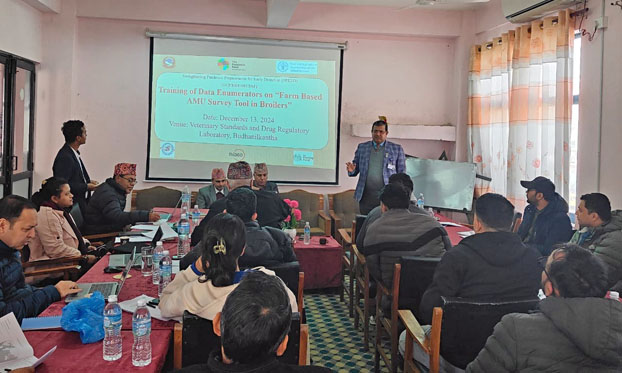 © FAO/Nabin Paudel | NEPAL Farm-based antimicrobial use survey in broilers
FAO, through the Pandemic Fund project and in collaboration with the Fleming Fund, is supporting the DLS and Veterinary Standards and Drug Regulatory Laboratory in conducting a farm-based AMU survey across 635 broiler farms in 29 districts across seven provinces. The survey aims to quantify antimicrobial use in commercial broiler farms and assess patterns of critically important antimicrobials, as listed by WHO/WOAH. Two training sessions on the AMU survey tool for broilers were held on 13 and 16 December for 35 data enumerators in Kathmandu. The study is expected to conclude in March 2025. |
Learn more about our work on AMR here.
| |
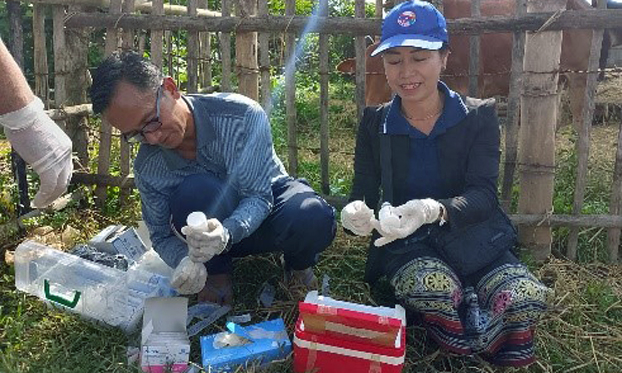 © FAO/Chattouphone Keokhamphet | LAO PEOPLE'S DEMOCRATIC REPUBLIC Supporting recovery mission in typhoon Yagi-affected provinces
With support from USAID, FAO supported the Department of Livestock and Fisheries (DLF) in conducting a recovery mission in September 2024 across eight provinces affected by Typhoon Yagi: Xayaboury, Luang Prabang, Oudomxay, Bokeo, Luang Namtha, Phongsaly, Xiengkhouang, and Vientiane Capital. The mission involved animal healthcare activities, public awareness campaigns, and distribution of veterinary materials in 121 villages across 40 districts. DLF vaccinated 10 515 cattle and 3 187 buffaloes against hemorrhagic septicemia, and 1 473 dogs against rabies, while treating 1 258 cattle, 383 buffaloes, and 14 pigs. Kaviphone Phouthavong, DLF Director-General, emphasized the need for local resource mobilization, emergency budgets, veterinary drug stocks, and post-flooding surveillance to ensure timely future interventions and strengthen food security systems. |
 © FAO/May Oo Khine | MYANMAR Community training and biosecurity kits distributed
From 21 October to 7 December, With support from USAID, FAO conducted 40 one-day community-level training sessions in Bago Region, Mandalay Region, and Shan State, reaching 2 000 livestock households. The training focused on farm biosecurity principles and the safe, effective use of disinfectants. Participants also received biosecurity kits containing disinfectant, masks, gloves, boots, sanitizer, a measuring cup, and training materials. Farmers learned to identify and manage biohazards, implement preventive measures, and reduce disease transmission risks. Of the households benefiting from this initiative, 27 percent were female-headed and 73 percent were male-headed households. |
Learn more about our work on risk mitigation here.
| |
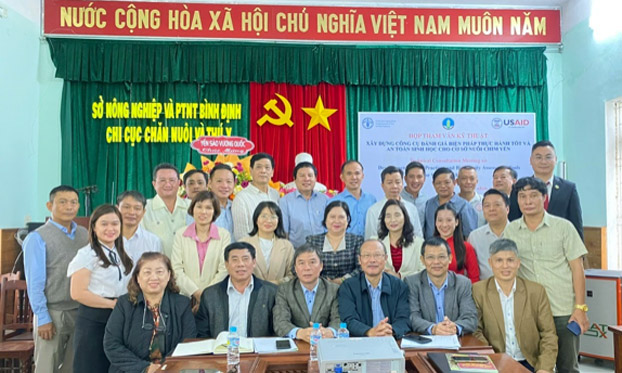 © FAO Viet Nam | VIET NAM Developing best practices and biosecurity assessment tools for swift bird housing On 27 December, FAO, in partnership with the Binh Dinh Swift Bird Association and the Sub-department of Livestock Production and Animal Health, supported the Department of Livestock Production and the Viet Nam Agriculture Farms and Enterprises Association in organizing a technical consultation meeting in Binh Dinh Province. The event, part of the USAID-funded project on mitigating health threats from animals, focused on developing biosecurity tools and best practices for the swiftlet bird production value chain using FAO’s progressive management pathway approach. |
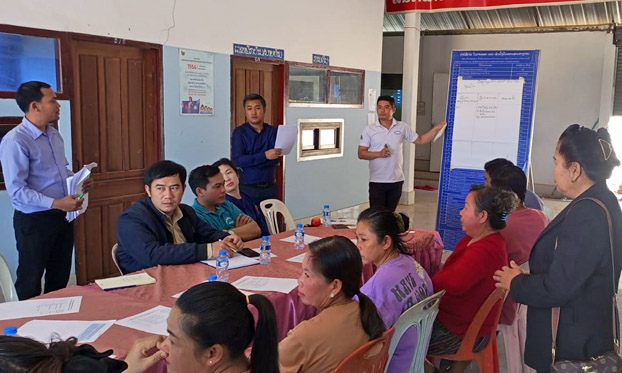 © fao/Senglar Souvannaly | LAO PEOPLE'S DEMOCRATIC REPUBLIC Advancing broiler farmer field schools to address AMR in Lao People’s Democratic Republic FAO facilitated capacity building for three master trainers from the Department of Livestock and Fisheries, Ministry of Agriculture and Forestry, alongside stakeholders in Lao People’s Democratic Republic’s poultry sector. Through the broiler farmer field school approach, this initiative focuses on improving biosecurity, promoting good practices, reducing antimicrobial use, and mitigating antimicrobial resistance (AMR) while increasing poultry farm profitability. From 15 to 18 December, with support from UK Aid and the Fleming Fund, and through the courtesy of FAO HQ behavioural scientist Anica Buckel, the field visit ensured milestones were met for timely success. |
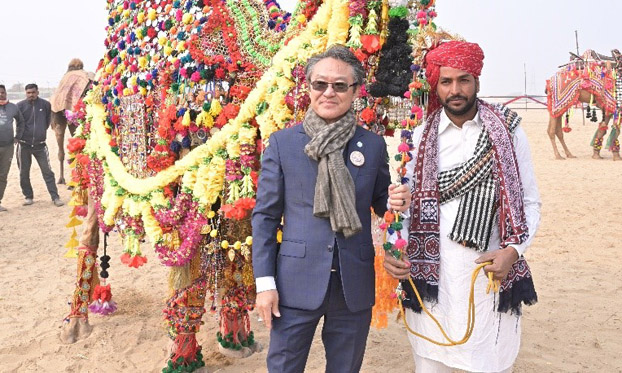 © fao/Pooja Chowdhary | INDIA Promoting a sustainable camel milk value chain in India On 20 December, FAO and the Department of Animal Husbandry and Dairying organized a high-level workshop under the project "Establishing pathways to integrate nutritional and therapeutic potential of non-bovine milk," focusing on the sustainable development of India’s camel milk value chain. The event addressed challenges in procurement, milk standardization, pricing, and market feasibility, while emphasizing camel milk’s nutraceutical and therapeutic value. It also highlighted the role of camelids as milch animals in pastoral communities. A video showcasing the camel milk value chain and its benefits for local communities was presented. Learn more here. |
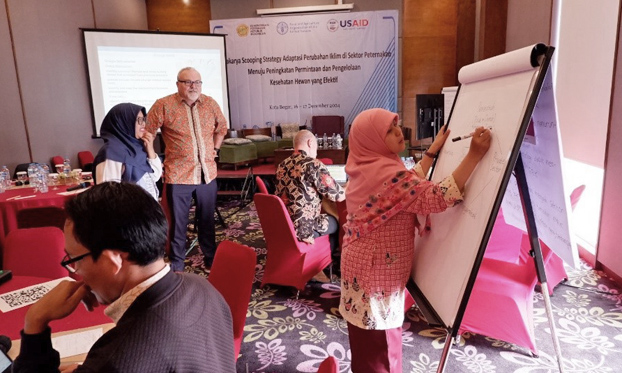 © fao/Satwika Movementi | INDONESIA Workshop on climate change adaptation strategy in livestock sector Between 16 and 17 December, the Animal Health Services of the Indonesian Ministry of Agriculture, with support from USAID and FAO, conducted a workshop in Bogor, West Java, on climate change adaptation strategies for the livestock sector. The event brought together 66 participants from various government agencies and IPB University to address challenges such as heat stress, feed and water shortages, and increased disease susceptibility due to climate change. FAO contributed technical support in developing climate-smart livestock practices and strategies. Key outcomes included enhancing veterinary services, disease surveillance, and promoting precision livestock farming and integrated crop-livestock systems. |
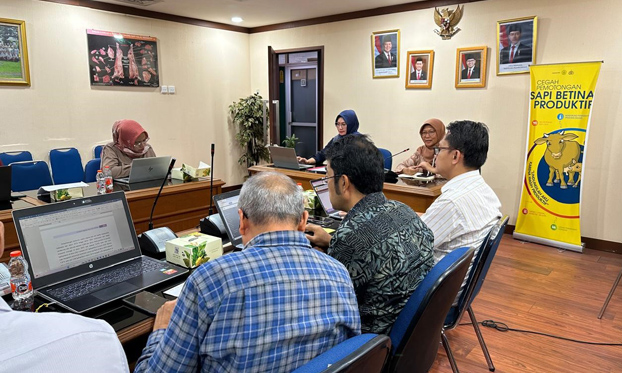 © fao/Azrina | INDONESIA Meeting on NKV certification procedures for animal product business units for service officers On 17 December, FAO Indonesia, in collaboration with the Directorate of Veterinary Public Health at the Ministry of Agriculture, held a meeting to introduce the updated veterinary control number national information system (SISNAS NKV) to service officers, with support from USAID. Since late 2023, NKV certification has been processed online through the online single submission risk-based approach, now integrated with SISNAS NKV. The meeting aimed to familiarize provincial service officers with new features and enhanced functionalities for more effective implementation of the system. |
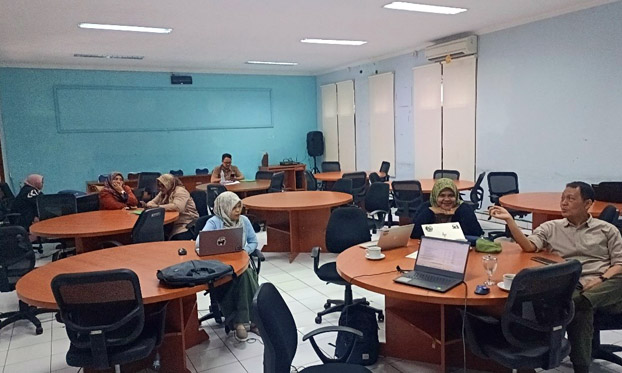 © fao/Riana Arief | INDONESIA Technical meeting on frontline FTP-WEBE preparation On 16 December, with support from USAID, FAO, in collaboration with the Ministry of Forestry (MoF), held a technical meeting to prepare for the pilot Frontline Field Training Programme for Wildlife, Environment, Biodiversity, and Ecosystems (FTP-WEBE) at MoF's Human Resource Education and Training Center in Bogor. The meeting addressed training schedules, mentor assignments for field assignments, and budget finalization. The pilot programme aims to enhance MoF professionals' capacity to address wildlife and environmental sector gaps, complementing existing public health and animal health training initiatives. |
Learn more about our work on capacity development here.
| |
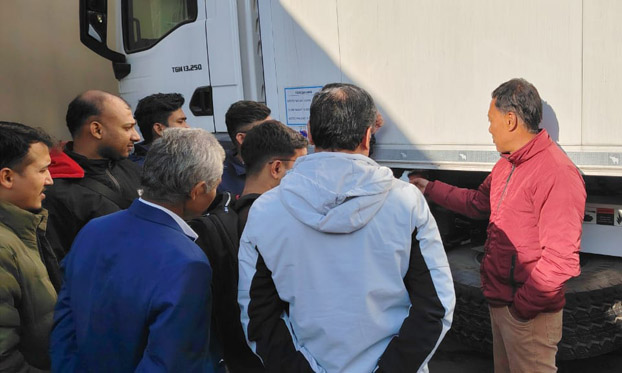 © FAO/Surendra Karki | NEPAL Training of trainers on cold chain equipment maintenance and vaccine management
FAO Nepal, through the Pandemic Fund SPEED project, conducted a 3-day Training of Trainers on Cold Chain Equipment Maintenance and Vaccine Management from 1 to 3 December in Kathmandu. Twenty animal health professionals from the national vaccine production laboratory, veterinary laboratories, livestock farms, central referral veterinary hospital, and other relevant offices gained hands-on skills in cold chain equipment maintenance and its importance in vaccine management. The training was organized in close collaboration with the Central Veterinary Laboratory and the Department of Livestock Services (DLS). |
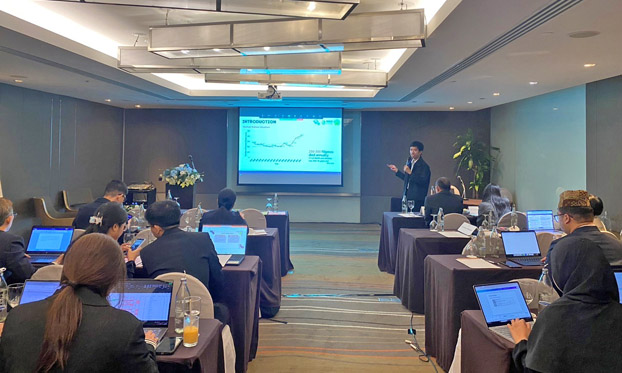 © FAO/RFETPV | ASIA AND THE PACIFIC R-FETPV scientific conference: showcasing epidemiology to address health threats
With support from United States Defense Threat Reduction Agency (DTRA) and USAID, Regional Field Epidemiology Training Program for Veterinarians (R-FETPV) held its annual scientific conference in Bangkok from December 2 to 4. Nineteen trainees from three cohorts presented their work, with the 2024 cohort sharing surveillance data analyses and earlier cohorts presenting disease investigation findings. Studies addressed critical regional health challenges, including ASF, avian influenza, rabies, anthrax, and hemoparasites. Five trainees successfully completed the R-FETPV. RFETPV 12-month second module, with four advancing to the joint master’s programme, reflecting the programme's commitment to building regional epidemiological capacity. |
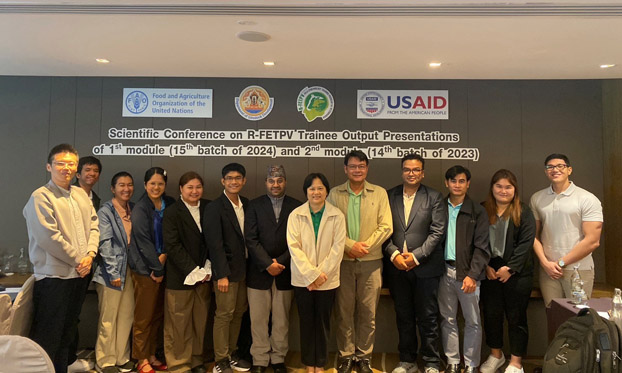 © FAO/RFETPV | ASIA AND THE PACIFIC Advancing veterinary epidemiology workforce: 12 trainees complete first module of RFETPV
Twelve aspiring veterinary epidemiologists from Thailand, Lao People's Democratic Republic, Cambodia, Indonesia, Nepal, and the Philippines successfully completed the first module of R-FETPV. This six-month module combined in-person sessions, including a joint course with public health FETP fellows, and three months of field practice focused on epidemiology and surveillance data analysis. Accomplishments of trainees showcased the dedication of their institutions and national authorities. The next 12-month module on outbreak investigation begins with a workshop on December 7. This programme, supported by the DTRA and USAID, strengthens veterinary epidemiology in the Asia-Pacific region. |
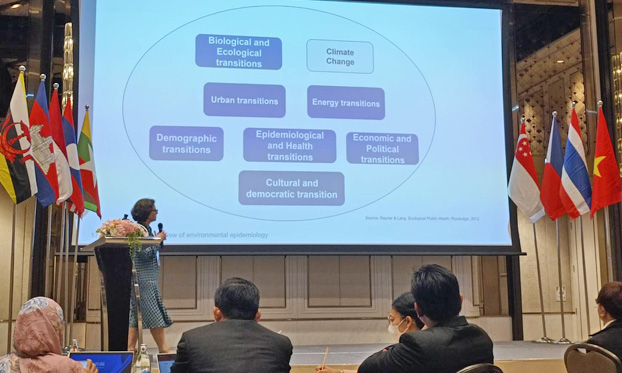 © FAO/Moon Mugyeom | ASIA AND THE PACIFIC Highlighting veterinary epidemiology efforts at environmental epidemiology workshop
FAO shared on its efforts in veterinary epidemiology workforce development as a One Health approach at the environmental epidemiology training workshop for ASEAN member states. The 5-day event, organised by the Thailand Field Epidemiology Training Programme (FETP) with support from ASEAN Member State (AMS) FETP Directors, the UK Health Security Agency, and Thailand’s Ministry of Public Health, brought together over 40 participants, including representatives from ASEAN countries and FETP trainees. During the workshop, FAO also actively engaged in discussions to identify potential synergies for advancing health security and foster multidisciplinary workforce development through One Health approaches. |
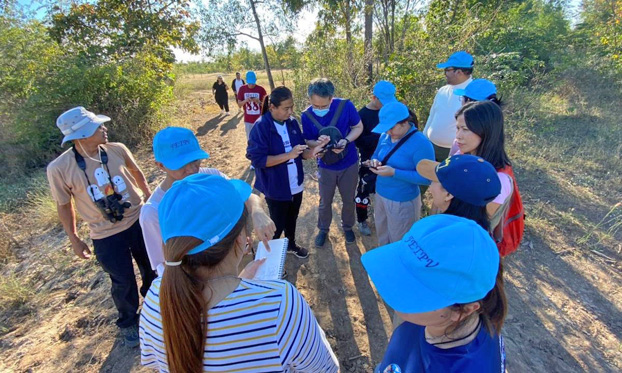 © FAO/RFETPV | ASIA AND THE PACIFIC Outbreak investigation field training equips veterinary epidemiologists
From 9 to 20 December, an outbreak investigation demonstration workshop trained 11 R-FETPV trainees from Thailand, the Philippines, Lao People’s Democratic Republic, Cambodia and Nepal in Chondan district, Phetchabun province, Thailand. Participants conducted a field investigation of a Hemorrhagic Septicemia outbreak in beef cattle and water buffalo, honing skills in investigating outbreak response and communicating scientific findings to non-technical audiences. Supported by DTRA and USAID, the training prepares trainees to lead outbreak responses and protect animal and public health. |
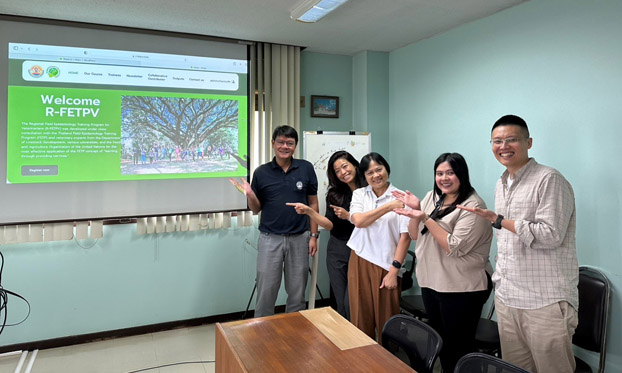 © FAO/RFETPV | ASIA AND THE PACIFIC Innovating online learning to strengthen veterinary epidemiology capacity
On 13 December, FAO convened a brainstorming session with R-FETPV and Kasetsart University, Thailand, to explore advancements in online learning for veterinary epidemiology. A Kasetsart University representative shared insights from research on multidisciplinary medical education, including a pilot study with R-FETPV. Achila Longchar, Virtual Learning Centre (VLC) Coordinator, introduced the platform. Discussions covered developing a learning management system for supporting mentoring, enhancing alumni engagement, and diversifying learning modalities to bolster in-service field epidemiology training for animal health and One Health professionals in Asia-Pacific. |
Learn more about our work on epidemiology here.
| |
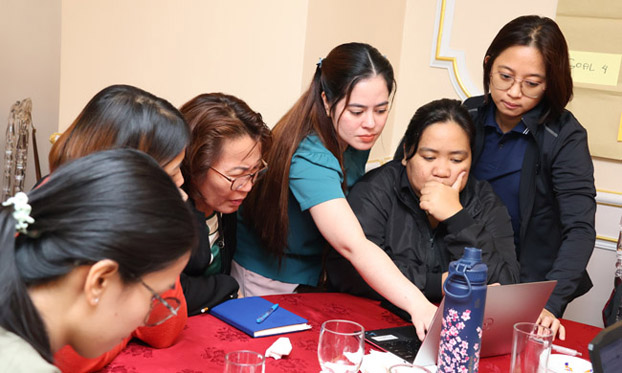 © FAO/RizzaLorena Espenido | ASIA AND THE PACIFIC AND THE PHILIPPINES Operational planning workshop strengthens efforts for national veterinary laboratory network
With support from USAID and DTRA, FAO assisted the Government of the Philippines, Department of Agriculture in organizing an operational planning workshop from 16 to 18 December. The event facilitated national, regional, and academic laboratories to develop a one-year operational plan to enhance coordination, communication and goal alignment for establishing the national veterinary laboratory network. This plan ensures the institutionalization of the network and supports implementing a five-year strategic plan for animal health resilience. |
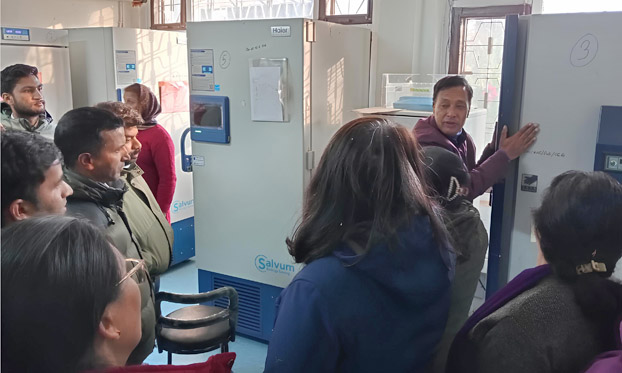 © FAO/Surendra Karki | NEPAL Training on cold chain equipment maintenance and vaccine management
FAO, through the Pandemic Fund project, conducted two training sessions on cold chain equipment maintenance and vaccine management for staff of the National Vaccine Production Laboratory (NVPL) and the Central Veterinary Laboratory (CVL) on 18 and 24 December. A total of 46 NVPL staff and 29 CVL staff participated, gaining hands-on skills in cold chain equipment maintenance and vaccine management. The training was conducted in close collaboration with the NVPL, CVL, and the Department of Livestock Services. |
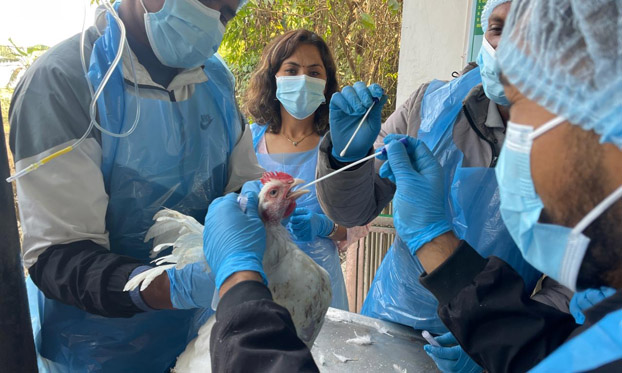 © FAO/Shrijana Khanal | NEPAL Training on sample collection, dispatch, and epidemiological reporting
Through Pandemic Fund, FAO supported the CVL in conducting two 2-day training sessions on sample collection, dispatch and epidemiological reporting from 3 to 6 December in Parasi. A total of 35 animal health professionals from Rupandehi, Kapilvastu and Parasi districts participated. The training aimed to equip participants with hands-on skills in appropriate sample collection, packaging, and dispatch for prompt disease diagnosis. The training was conducted in collaboration with the DLS and the Veterinary Laboratory, Parasi. |
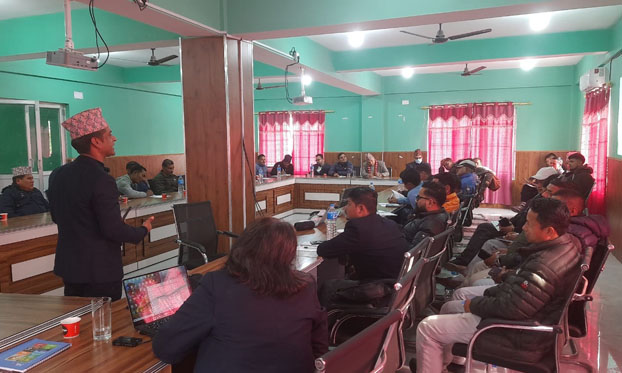 © FAO/Sambriddhi Nepal | NEPAL Laboratory clinical interface workshops for animal health professionals
FAO, through the USAID, supported the DLS in conducting two laboratory clinical interface workshops in Kailali and Kanchanpur districts on 29 and 30 December. A total of 65 animal health professionals participated. The objective of the workshops was to share AMR patterns based on data from the Veterinary Laboratory in Dhangadhi and to improve evidence-based practices. The workshops were conducted in collaboration with the Central Veterinary Laboratory and the Veterinary Laboratory in Dhangadhi. |
Learn more about our work on capacity development of laboratories here.
| |
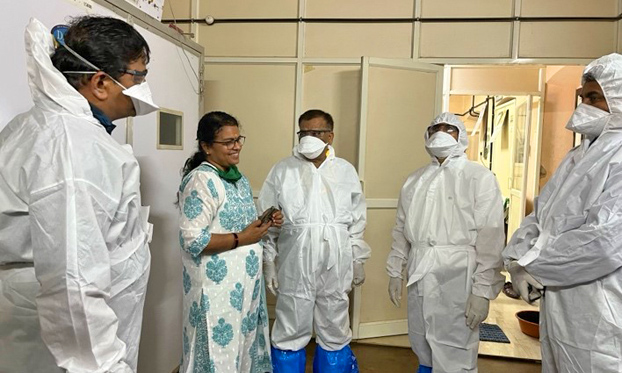 © FAO/Acty George | INDIA Scoping mission in Kerala advances farm biosecurity for duck and poultry farming
From 26 to 29 November, FAO conducted a scoping mission in Kerala to assess duck and poultry farming systems in the Kuttanad region and develop a targeted farm biosecurity training plan. Supported by USAID, the mission identified high-density farming areas, assessed training needs for veterinarians, paraveterinarians, and farmers, and engaged with stakeholders, including local farmers and State Animal Husbandry Department officials, to address management and biosecurity challenges. Insights from the mission will inform a comprehensive, locally tailored biosecurity training programme, promoting sustainable practices and bolstering disease prevention efforts. |
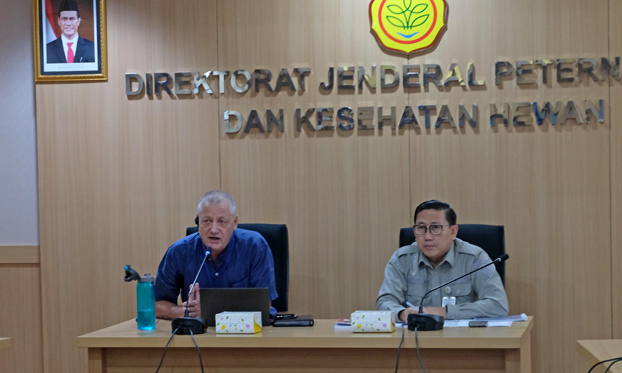 © Ministry of Agriculture | INDONESIA Supporting Indonesia’s national free nutritious meal programme
On 12 December, FAO, in collaboration with the Ministry of Agriculture and with support from USAID, convened a coordination meeting in Jakarta to discuss the Global Health Security Program (GHSP)'s role in supporting the national free nutritious meal programme (MBG), a key government initiative. The meeting refined GHSP’s planned activities to focus on animal health and food safety within MBG, aligning with its mandate on zoonoses and emerging infectious diseases. The discussion clarified pathways for aligning global health initiatives with national priorities. |
Learn more about our work on risk reduction along the value chain here.
| |
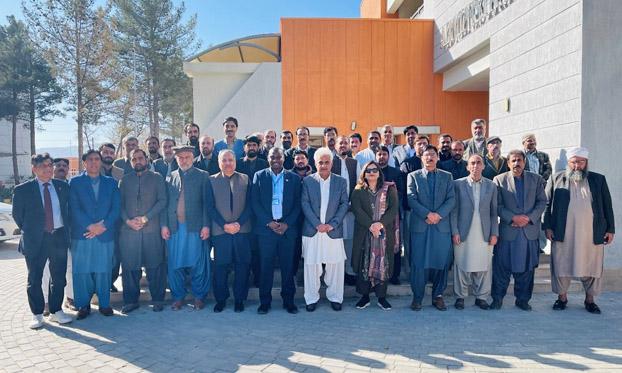 © FAO/Shahveiz Hassan | PAKISTAN Strengthening animal disease surveillance On 11 December, FAO, with funding support from the USAID, supported the Ministry of National Food Security and Research, in organizing a workshop at Balochistan Agriculture University in Quetta to enhance animal disease surveillance in the country. Forty participants, including livestock officials, veterinarians, and NGO representatives, discussed strategies for improving surveillance systems and rapid response mechanisms. The event, part of a One Health-focused study, aims to strengthen emergency preparedness and address zoonotic and transboundary animal diseases in Pakistan. Through this initiative, FAO and USAID are reinforcing their commitment to improving the resilience of Pakistan’s agricultural sector, ensuring that animal health is prioritized as a critical component of the country's broader health and development agenda. |
| Learn more about our work on surveillance here. | |
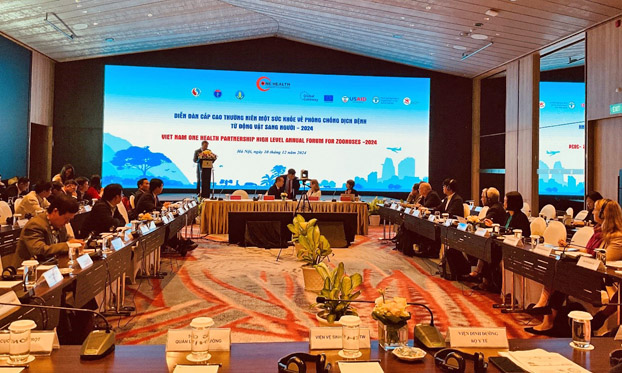 © FAO/Nhu Van Thu | VIET NAM Vietnam One Health Partnership forum reviews progress and fosters collaboration On 10 December, the Vietnam One Health partnership high-level annual forum for zoonoses 2024 brought together 150 participants from 90 local and international agencies, alongside hundreds online. Co-chaired by officials from the Ministry of Agriculture and Rural Development, Ministry of Health, USAID and FOUR PAWS International, the forum reviewed achievements by five technical working groups under the partnership framework. Supported by the EU-funded project, discussions focused on policy recommendations and mechanisms to enhance international collaboration in zoonotic disease prevention and control. Read more here. |
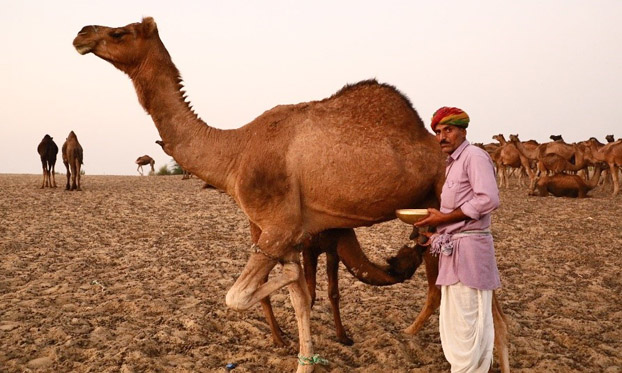 © FAO/Bushra Owaisy | INDIA Capturing camelid contributions ahead of International Year of Camelids event From 4 to 6 December, FAO, as a part of the project "Establishing pathways to integrate nutritional and therapeutic potential of non-bovine milk, visited Bikaner, Rajasthan, to document camelid contributions for the International Year of Camelids event on 20 November 2024. The video will showcase the benefits and market potential of camel milk and other camel-derived products, emphasizing camelids’ role in livelihoods, food security, and cultural heritage. By engaging policymakers, entrepreneurs, and consumers, the initiative aims to enhance support for camelid industries and foster sustainable development in pastoral communities. |
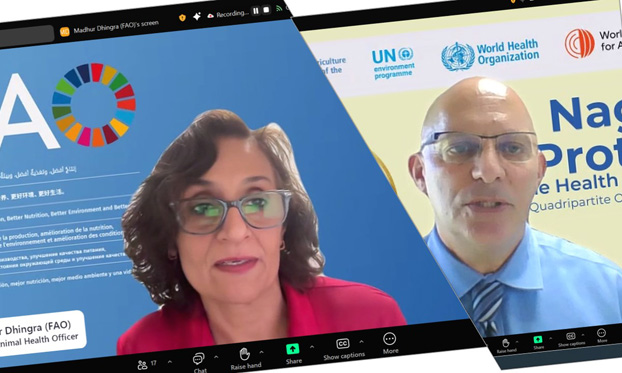 © FAO | ASIA AND THE PACIFIC Asia-Pacific quadripartite webinar on Nagoya Protocol from One Health perspective FAO co-organized a webinar on the Nagoya Protocol with focus on One Health. The Nagoya Protocol is an international agreement that promotes fair sharing of benefits from genetic resources while ensuring conservation and sustainable use. It requires prior informed consent from resource-providing countries. The webinar was co-hosted with the United Nations Environment Programme, World Health Organization and the World Organisation for Animal Health last 26 November. Experts discussed strategies for implementing its provisions, highlighting the importance of shared responsibility in preserving biodiversity and promoting sustainable development, while addressing regional environmental challenges. |
| Learn more about our work on One Health here. | |
